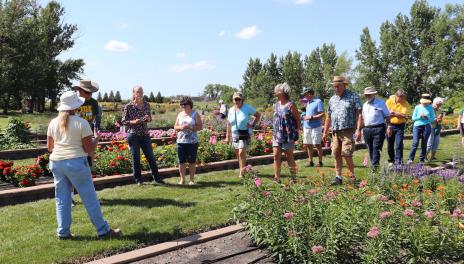NDSU Extension Master Gardener Program Invests in North Dakota Communities
In the mid-1970s, an Extension agent in Washington state named David Gibby and his colleague Bill Scheer were inundated with home gardening questions from rapidly urbanizing areas. The two community-minded agents came up with the concept for the Extension Master Gardener (EMG) Program.
They would recruit and train volunteers to answer gardening questions and serve the needs of their communities. Two hundred applicants were accepted into the program and completed a 40- hour horticulture training. Upon completion, Master Gardeners were expected to volunteer with the gardening public under the supervision of Extension.
The volunteer program was a success and has inspired programs in land-grant universities in 49 states, Canada and South Korea. The Extension Master Gardener Program is celebrating its 50th anniversary in 2023. The program has grown to more than 86,000 volunteers in 49 states.
The NDSU Extension Master Gardener Program was started in 1980 and currently has more than 400 volunteers.
Each year, NDSU Extension offers a 40-hour EMG Core Course to train new interns. The course covers a wide variety of topics such as botany, ornamental plants, trees, soils, plant pathology, entomology, wildlife management, lawns, fruits, vegetable production and plant diagnosis. In exchange for this valuable education, the interns agree to volunteer in cooperation with NDSU Extension in communities around the state.
“The NDSU Extension Master Gardener Program goes beyond ordinary and invests in creating leaders to serve the needs of their communities,” says Esther McGinnis, NDSU Extension horticulturist and Master Gardener program coordinator. “Master Gardeners become ambassadors to assist NDSU Extension in providing scientifically accurate and environmentally sustainable horticultural advice.”
Extension Master Gardeners answer gardening questions in county NDSU Extension offices, organize horticultural workshops, give talks and demonstrations, fight food insecurity, conduct citizen science and teach children the joys of gardening. They also beautify the state by designing and maintaining community, school and church gardens. Public institutions such as zoos, historical sites and museums also greatly benefit from the generosity of Extension Master Gardeners.
Some of the 2022 NDSU Extension Master Gardener (EMG) Program highlights include:
- EMGs grew or collected 33,080 pounds of produce to benefit 42 food pantries in 23 counties. Since 2014, EMGs have donated 144,022 pounds of fresh produce to local food pantries. This is the equivalent of 576,088 servings of fruits and vegetables.
- 36 EMGs conducted 211 vegetable variety trials across 21 counties to identify the best varieties for home gardeners.
- 101 EMGs cared for 70 ornamental gardens in 24 counties across the state.
- EMGs planted four demonstration bee lawns at the Dakota Zoo (Bismarck), Augustana Lutheran Church (Grand Forks), Ellendale Buzz Garden (Ellendale), and the Minot Pollinator Project (Minot).
- EMGs maintained 38 public pollinator gardens in 21 counties.
- In 2022, 209 EMG volunteers and interns reported 12,510 volunteer hours in 37 counties.
- From 2013 through 2022, NDSU Extension Master Gardeners donated a total of 93,613 hours to horticultural-based community service. The value of this volunteer service to North Dakota is $2,415,192.
FOR MORE INFORMATION:
Esther McGinnis, 701-231-7971, esther.mcginnis@ndsu.edu
